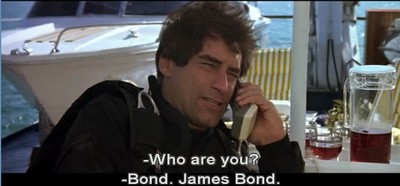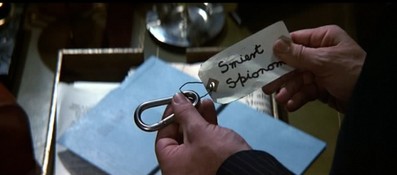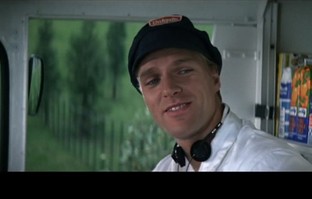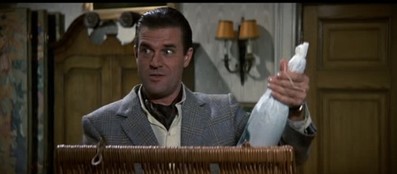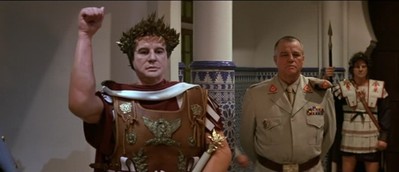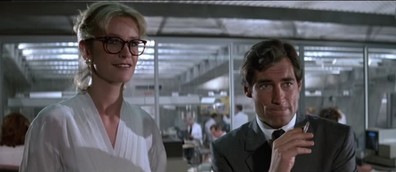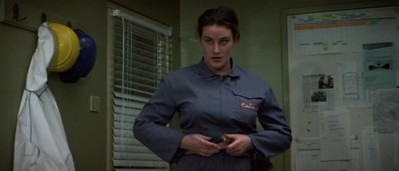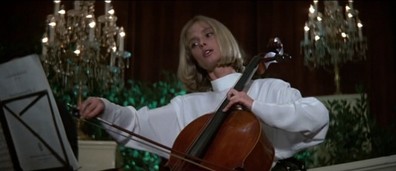Bond Girl: Re-Watching and Re-Evaluating The Living Daylights
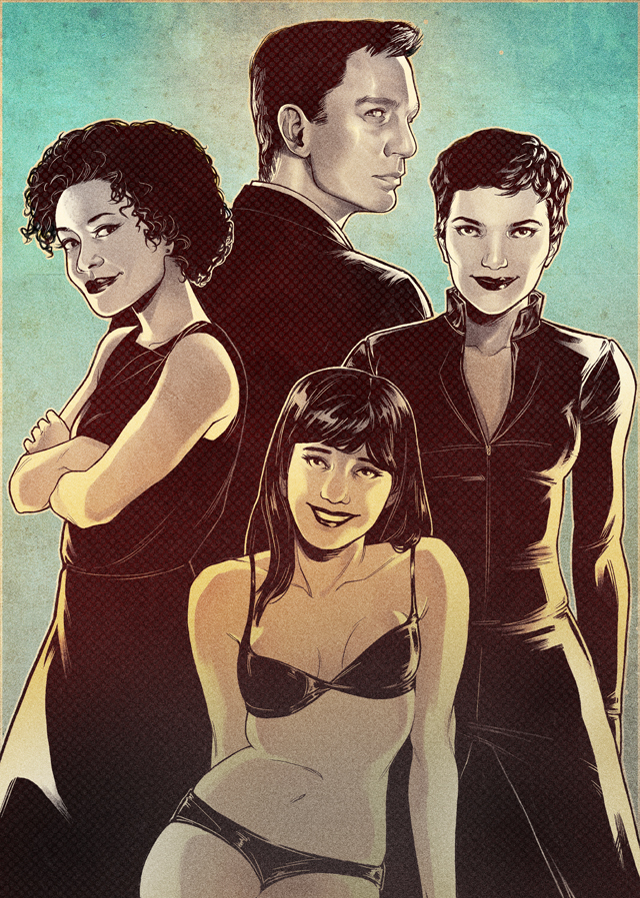
Original illustration by Emilie Majarian for The Mary Sue.
Welcome to Bond Girl, a new series where we’ll be re-watching and re-evaluating every James Bond film until Spectre’s release. Check out previous entries here.
Content warnings for sexual assault, threats of assault, and brief mentions of racism.
I always get such a thrill when the actor playing James Bond introduces himself for the first time. It’s one of my favorite things about the franchise and from the start, I haven’t been able to stop myself from making the highest of the high pitched noises. There’s something about these actors introducing themselves as “Bond. James Bond.” that gets me really pumped for a new actor.
Now Timothy Dalton was only in two Bond films so I get to enjoy him without getting attached to him. Well… without getting any more attached to him than I am now. The Living Daylights is the fifteenth entry in Eon Productions’ James Bond series and it’s the last of the Bond films to use a title from one of Ian Fleming’s stories or novels until 2006’s (definitely awesome) Casino Royale. The film’s plot revolves around Bond’s attempts to find out the truth after a Soviet defector claims that the new head of the KGB is systematically assassinating agents from the US and Britain. It’s all a ruse though and our man of international mystery finds himself on a race to stop an evil arms dealer from starting another world war.
I know that I’m usually only vaguely interested in the actual plot of these films. I watch them for the ladies and the gadgets and I’m fine with that. The more history and direct ties that I can make between a Bond film and things I’ve studied though, the more interesting I find the plot. With The Living Daylights focusing firmly on Russian and British intergovernment relationships and defection from the Soviet Union along with a terribly shady arms dealer, I honestly found myself riveted.
The plot of The Living Daylights is a twisty one and not as straightforward as some of the other plots in other Bond films and it’s helped along by characters I enjoy watching. My interest in almost everything is usually character driven which is why for many of my recaps I’m kind of like, “Plot? What plot?” because I really tend to put the characters first.
Lately I’ve been doing a bit better because the plots are either interesting or infuriating. Thankfully for me, The Living Daylights is the former rather than the latter in terms of plot. The Living Daylights is one of those films that bounces all over the place in terms of setting but the plot stays pretty cohesive. You don’t lose it even though the two-hour film can feel a bit tedious at times.
The action starts with the pre-credits scene. In many Bond films, the pre-credits scene has little if anything to do with the actual movie. It’s the set up for a joke or a reminder that Bond is the best at what he does. In this film though, the pre-credits scene has a direct connection to the main body of the film. It opens with M and two other members of the 00 unit doing a field training exercise similar to the one that Sean Connery did in Never Say Never Again. The only thing is that there’s someone on the island that isn’t playing the game.
The henchman that shows up and takes out one of the 00s before setting his sights on Bond dies before the credits start but he leaves behind one very important clue that will be a major part of the film: a tag with the phrase Smiert Shpionam written on it. The phrase “death to spies” is a recurring phrase in the narrative. The KGB’s policy that all spies must die is a thread of the plot that thickens as American and British spies are murdered on what appears to be orders given by the new head of the KGB.
KGB General Georgi Koskov claims that he’s defecting from the KGB because of this and we go through the process of having Bond and his handler smuggle him out of Czechoslovakia and into the UK. From the beginning, I thought that Koskov was shady.
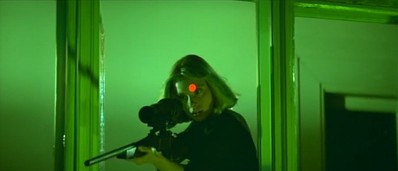
For me, what made me question the reality of his claims was the use of a young female cellist as his assassin. When Bond is actively questioning her presence due to how obvious it is that she has no idea what she’s doing or even how to hold a gun, I’m right there with him because it’s too neat.
Koskov’s defection should be a big thing, I’ll admit that, but it shouldn’t be as big a thing as it winds up being. He’s not that important a man that everyone comes out after him, and as we see later on in the film, only a few people know about his supposed defection. Here’s the thing about his plan for defection, it was almost too good to be true.
He has it all:
- Aid from the British
- Dirt on the Russians (especially current KGB head Leonid Pushkin)
- Proof that he’s a wanted man and that they want him dead or alive
And yet the assassin that the Russians send after him doesn’t even know how to hold her rifle? Okay, sure. No wonder that Bond is convinced that they’ve been all played for fools.
Two good things come out of those early scenes though: the introduction of Kara Milovy (Maryam d’Abo) and Rosika Miklos (Julie Wallace), two female characters that I loved and who I’ll talk more about a little later on in this recap. Trust me though, Kara is our main Bond girl and absolutely integral to the film while Rosika’s one scene is just hilarious.
After Koskov’s defection to Britain, we get the first big stirrings that something isn’t quite right. A headphone wearing man who can mimic people’s voices goes through and kills well… a ton of people in his quest for Koskov. He’s supposed to be working with the Soviet government, bringing Koskov back for a long stint in Siberia but here’s the kicker: he’s not working for the Soviet Union at all.
All of this mess that Bond winds up getting sucked into is an elaborate plot by Koskov and the biggest jerk in the world, arms dealer and history aficionado, Brad Whitaker. Koskov isn’t wanted by the KGB because he’s defecting. He’s wanted because he’s been stealing funds from the government, funds that he then plans to use to buy both opium and weapons. The goal is chaos and war, plain and simple and the two men want to have all of the loose ends wrapped up.
That means killing Kara and Pushkin and either killing Bond, or framing him for the Pushkin’s death.
Of course, none of these things happen because in Bond movies, he always comes out on top. The bad guys in this film are very obviously bad guys.
General Koskov is a jerk of the highest order, framing his girlfriend in a very clear attempt to get her killed and betraying basically every single person that comes into contact with him. And with Kara in particular, there’s no reason for it. He just wants to kill her. He just wants to cut this loose end before she can get him into trouble and there’s no way that she can be used against him. Of course, had he taken Kara with him (or not included her in his plot in the first place), Bond wouldn’t have known about the plot and the movie would’ve been quite different.
At the same time that I see Koskov as a selfish jerk, Brad Whitaker is just a loser to me. He’s this smarmy mess of a man that rewrites history to suit his imagination. Sure, many people write historical fiction but Whitaker’s obsession with what he calls his “pantheon of great commanders” is just a bit much.
Whitaker went into the arms dealing trade because he was an utter failure in the military. Despite how much of a love he has for the military and for war, he never got very far. He was expelled from West Point for cheating and wound up working in the Belgian Congo as a mercenary, something I’m sure he was terrible at as well.
Seriously, who gets kicked out of West Point for cheating?
Whitaker is a student of historical fiction and he takes it to the very extreme, having a fascination for some of the most terrible commanders in history. In his hallway devoted to these men (and they are only men because apparently no woman in history has ever managed to fight in a way that made him marvel), he has statues of Adolf Hitler and Oliver Cromwell mixed with statues of Julius Caesar and Napoleon. And here’s something that’s super messed up – all of these men, all of Whitaker’s heroes? Well they’re sculpted to look like him (you know, because that’s not remotely creepy…)
He waxes poetic about these men – some of whom were actual monsters – to the point where it’s disturbing enough for Pushkin to comment on them.
Brad Whitaker: How do you like my personal pantheon of great commanders?
Leonid Pushkin: Butchers.
Brad Whitaker: Surgeons. They cut away society’s dead flesh.
He’s so proud of these men. He’s worshiping at the altars of men like Patton and Hitler and seriously, that explains so much about his character and why he chooses to get hip deep in this international conflict that threatens to send the world right up to the doors of World War Three. In his head, war is good. War is the best thing for civilization because the people calling for war are, according to his logic, culling the world of unnecessary burdens. He sees the people that die in the various wars and military conflicts “society’s dead flesh” as if they must be removed.
While Koskov and Whitaker are decent villains because of how much they make me want to leap feet-first into The Living Daylights and help Bond kick their teeth in, there’s a definite difference in how I look at our main henchman for the film, Necros (played by Andreas Wisniewski).
I read somewhere that Necros was from the Red Grant style of henchman and I have to agree. If you’ve forgotten by now, Red Grant was the henchman that nearly got the best of Bond back in From Russia With Love. He was coldly attractive, superhumanly powerful, and very dedicated to his job. He was also, in the book at least, suggested to have traits more commonly associated with lycanthropy in fiction.
So here’s hoping that Necros was secretly a werewolf too.
We learn absolutely nothing about Necros throughout the film but that’s not actually a shock. This film is actually pretty low on backstory for everyone. What we do get from Necros in this film is a villain that basically kills everyone that he can. He’s notable for his looks, his ever-present set of headphones, and his ability to adopt false accents and personas at the drop of a hat. He’s not the best henchman out there (because right now it’s a three-way tie between Gobinda, Oddjob, and May Day for me), but I liked his interactions with the characters way more than I did Whitaker and Koskov’s.
Despite all of this, he still wasn’t my favorite character in this film.
For The Living Daylights, there was another three-way tie when it came to characters I liked. Kara Milovy may be the Bond girl for the film but the one-off character Rosika and our eternally underused Miss Moneypenny (played by Caroline Bliss for this film and the one after) still manage to shine in small ways.
Let’s talk about Moneypenny first. Caroline Bliss doesn’t have quite the shame charms as Lois Maxwell, a fault I attribute more to Lois Maxwell’s lengthy presence in the franchise than to Bliss’s acting on any level. The film’s writers seem to have taken away some of the humor from the character and her dry delivery of dialogue isn’t exactly on point, but she’s cute, okay. I’m only getting her for two movies so I’m going to have to be okay with how this Moneypenny is basically a gigantic dork falling over herself for Bond in a way that seems even funnier than Maxwell’s take on the character.
One day I’m going to sit down and analyze why Moneypenny’s pining is written for laughs and why her attempts at getting Bond to see her as someone worthy of romantic entanglement is played off as a joke. Why again is it funny that Moneypenny really likes the man she’s been working with for years and that flirts with her? Why is it that her failure to get Bond to notice her might as well have a cheap laugh track stuck on alongside it?
Ugh.
Rosika Miklos is another character that gets a little bit of screen time but unlike Moneypenny who rarely gets the time I think she deserves, she’s a very minor character. Rosika is Bond’s contact in Czechoslovakia and she helps him get Koskov out of the country. She’s a very minor character to fixate on but she has one of the most hilarious scenes in a Bond film and I couldn’t help myself. I needed to talk about her.
After getting Koskov into the pipe and telling Bond how to run it, Rosika heads off with a wrench in her hand. When Bond asks her what she’s leaving to do, Rosika tells him that she’s “going to take care of the supervisor” so that he doesn’t notice their subterfuge. The implication is heavy that “take care of” is slang for “kill horribly” which is why the scene that we actually gets is so funny.
It’s a needlessly sexualized scene where Rosika distracts the supervisor by partially disrobing and then smushing his face into her cleavage. It’s so over the top and so dang weird that I couldn’t stop laughing. I couldn’t believe that this was an actual scene that I was looking at but nope, after going back to the scene several times in a row, I had to admit defeat and that it was something someone thought integral to the Bond franchise.
Moneypenny and Rosika are great but I’m going to be honest here, Kara Milovy really grew on me as a character. I don’t know what it was about her character, but I went from feeling cool towards her to rooting for her.
It might have been the cello, maybe.
Or the fact that she’s framed as innocent but not naïve. She’s Koskov’s girlfriend and she trusts him, but the second that she realizes that he’s betrayed her and that he wants her dead, she turns on him. I like maybe 75% of how her relationship with Bond sets up. Normally, the idea that a relationship starts with lies bugs me endlessly but in this, I could understand why Bond did what he did.
Well – up to a point.
There were two super low points in this film and they both dealt with Kara being sexually assaulted or threatened with sexual assault. About two-thirds of the way into the film, there’s a scene that makes me feel like turning off my DVD player every time I see it. I’m not sure why, but I do spend a lot of time thinking about Dalton as a kinder, softer Bond. This scene threatens to undo all of that because in it, Bond literally rips off Kara’s clothing. He literally tears her clothes off as she cries out and then uses her bare body as a distraction for a gunman set to burst in on them. Let’s be clear here: he assaults her, strips her against her will, and then puts her into a situation where she could be hurt badly. And of course, it isn’t as if Bond apologizes for any of it.
Somehow, it doesn’t fully destroy any positive feelings that I have for James Bond’s relationship with Kara but it comes pretty damn close.
But the ick doesn’t stop there. Later on in the film near the end, James Bond and Kara are taken by Koskov’s men and thrown into the jail on a Russian base in Afghanistan. The head of the prison eyeballs Kara and then says that it’s been a long time since he had a female prisoner. It’s done in a way that makes his intent pretty clear and then it gets worse! He grabs Kara and tells her to take her clothes off. When she screams, he tells her that the room is soundproof so the can go ahead and scream all she wants.
This is while Kara is the only woman in the room and the scene is super tense. It’s actually one of the hardest things to watch in the entire film and I strongly wish that it hadn’t been included. At least, unlike the scenes with Bond, Kara gets to get some kind of revenge in the following fight scene, taking out one of the soldiers that was standing around and watching their commander threaten and assault her.
Why is this the typical avenue for many of the female characters in this franchise?
Either they’re assaulted onscreen or they’re assaulted offscreen but the one constant is that someone, some man is going to assault them over the course of the film. And it’s typically sexualized because violence against women is such a huge turn on for the film industry, I’ve noticed.
It’s a little hard to deal with especially because Timothy Dalton, like his successor Pierce Brosnan, is kind of framed as a more sensitive James Bond at times. There’s even a noted push for Bond to follow “orders not instincts” in the course of the film. He’s chastised for not shooting Kara and the blame is put on him getting distracted by a pretty face and on him getting soft. He’s this caring guy for most of the film aside from the aforementioned scene with Kara and one with Pushkin where he truly looked like he was about to do something regrettable.
Author’s Note: So a little while ago @WorfWWorfington on twitter informed me that I made a pretty huge mistake . The woman that James Bond assaults in the scene with Leonid Pushkin in the hotel room is not Kara Milovy, she’s Pushkin’s paramour. Until I double checked the DVD, I was still 100% sure that it was Kara and was willing to swear on it. I’m not sure how I missed that, but I did. I’m glad that they caught my mistake and I’m sorry for the confusion.
What’s difficult for me – what’s been difficult for me – is reconciling memories with actual moments in the film. What didn’t matter to me ages ago, matter more than anything to me now. I can’t ignore stuff like rape jokes and threats or the cloying, pervasive racism of the way that James Bond talks about the Afghani people. It hits me harder in the films that I haven’t seen in ages actually, that’s part of why I get so mad because my memories of what I’ve watched and the reality just don’t mesh.
Next week’s film (and Dalton’s last in the Bond franchise) isn’t going to be much better than this one, but trust me, I’m a bit more prepared for the anger and desire to write all the things about the plot.
What I’m looking forward to:
Not Licence To Kill, that’s for sure. This might be one of my least favorite of the modern Bond films actually because it centers around the Latin American drug trade in what’s probably a hugely stereotypical way and uses violence against women (and fridging!) as a major plot point. This is going to be bad. Even my unending love for Timothy Dalton can’t make me go easy on the fact that this film is super close to just being the Bond film that I hate more than anything. He’s nice to look at but this film is… not a thing I enjoy on many levels.
What’s great though is that after this we get to Pierce Brosnan and Goldeneye. I’d have to be dead to not get any enjoyment out of this film. Best theme song, best Bond, best scary Bond villainess, best M in the universe. At the very least, I love this movie so much that it might make up for the fact that I’m possibly going to tear Licence to Kill to shreds next week.
Stitch writes about comics, nerd history, and ridiculous romance novels when not working frantically on her first collection of short stories. Find her on her blog or on Twitter.
—Please make note of The Mary Sue’s general comment policy.—
Do you follow The Mary Sue on Twitter, Facebook, Tumblr, Pinterest, & Google +?
Have a tip we should know? [email protected]
